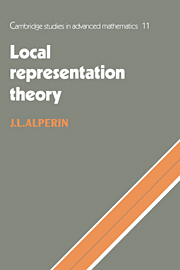 Local Representation Theory
Local Representation Theory II - Projective modules
Published online by Cambridge University Press: 12 January 2010
Summary
In the previous chapter, we studied semisimple modules and used them to see how the A-module A could be described in terms of semisimple modules. In fact, the radical and socle series of any module allow us to visualize it as made up of many semisimple layers, like a many-layered cake. In this chapter, we shall slice the cake! We shall study how modules can be decomposed into direct sums of indecomposable modules with special attention to the most important case of the A-module A. We shall be able to give complete information about certain group algebras, for cases that will be of key importance for later developments.
Indecomposable modules
We shall begin by studying the general properties of modules which do not have non-trivial direct sum decompositions, the indecomposable modules, and how arbitrary modules can be expressed as direct sums of these indecomposable modules. In the following sections we shall apply these ideas to the A-module A and to group algebras in particular.
Our first goal is to establish the basic characterization of indecomposable modules in terms of their endomorphism algebras. An algebra A is said to be local (terminology adapted from commutative algebra) if A/rad A is isomorphic with k.
Lemma 1The algebra A is local if and only if, every element of A is nilpotent or invertible.
Proof First, suppose that each element of A is either nilpotent or invertible, so that certainly the same holds for the algebra A/rad A.
- Type
- Chapter
- Information
- Local Representation TheoryModular Representations as an Introduction to the Local Representation Theory of Finite Groups, pp. 21 - 53Publisher: Cambridge University PressPrint publication year: 1986
- 1
- Cited by
